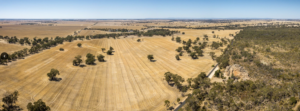Skip to:
- Give Today
- Contact Us
- Media
- Search
News & Stories
Leadership Development Program
Undergraduate Teaching Program
Common search terms
Louise Hobbs (Cohort 2021) began her classroom career this year at Goroke P-12 College in Victoria’s Wimmera region, where she teaches Agriculture, Science and Business Studies.
While some might be daunted at the thought of starting out in small rural school, it’s the perfect homecoming for Louise, who grew up nearby on a family farm and is already using her own experiences to support her VCE students.
As we head into Term 3, Louise shares her motivations for pursuing teaching along with her insights into the educational equity challenges faced by rural students.

Tell us about your own education path?
I attended Kaniva College before moving to St Brigid’s College Horsham to finish my VCE. From there I attended Monash University where I completed my Bachelor of Science with a major in Pharmacology and minors in both Immunology and Business Management. During my time at Monash, I also completed a full stream of environmental and atmospheric sciences.
What was your motivation for applying for the Leadership Development Program?
Throughout my time at Monash, I learnt so many awesome things about science that I really wanted to share these with as many people as possible. Originally, I was planning to enter the pharmaceuticals field, but upon completion of my degree I felt that I didn’t have that platform to share knowledge or be creative.
That’s when I found TFA. I realised that TFA’s mission to achieve educational equity is what I had been wanting to do the whole time. I wanted to return to a country school and teach specialist VCE subjects, to students who would otherwise be doing so via distance education. I think it’s really important that quality STEM programs are delivered in schools.
What has been the best thing about starting teaching so far?
The ‘aha!’ moments from the kids. It’s so rewarding when you’re teaching a difficult concept — say subatomic particles or cation exchange ratios — and a student just looks at you and says OMG! I get it! That’s the best.
What have you been challenged by so far, and how do you think you might tackle that?
Since teaching Agriculture, I’ve noticed a real lack of good available resources. I love to teach lessons which have some hands-on or applied aspect, but it’s certainly been a surprise and a challenge having to create the majority of my resources for this subject area from scratch.
Let’s talk about your podcast – Miss Hobbs Talks All things VCE – What gave you this idea and how have students responded?
It came about all before our first SAC. I was originally planning on making a revision lecture video and posting on YouTube, but then I remembered back to when I was in Year 12 and used to listen to Andrew Douch’s Biology Podcasts on the drive to school.
I recorded my first revision podcast and told the kids it was up. They loved it – I could see how many views it was getting, and I have to be honest the SAC results were what sold it for me. I record them on Audacity which is free software and upload them to a podcast server which puts them on Spotify!
The best thing about the podcasts is students can listen on the bus on the way to or from school. I even had one student tell me they listened to it as a family whilst they were road tripping in the holidays! Since then I started an Instagram account @mshobbsteaches to share my podcast and other cool things we have been doing in class.
Tell us about your school – Goroke P-12, in Victoria’s Wimmera region.
Goroke P-12 College is a fantastic school, I love the flexibility it provides me. The whole management team has provided me with so much support, but also the freedom and creativity to put my own stamp on things.
It’s awesome to be part of such a tight knit community, where you get to know your students and their families. We have had some fantastic community events this year. I’m even part of our Connected Communities Committee where we design whole community events. It’s also great to be back in the Wimmera. I don’t think I truly appreciated the value of growing up in a small rural community until my return!
From your own experiences as a student and now a teacher, what are the equity challenges you see for students in regional and rural schools in Victoria?
Subjects on offer in country schools is one of the biggest equity issues students in regional Victoria face. For many students currently completing their VCE, they face the challenge of distance education year in, year out. Last year’s transition to complete online learning due to COVID-19 actually saw all students receive special consideration due to lockdown, but this was really just a taster of the everyday challenges faced by rural students completing their Year 12.
Finally, what would you say to someone thinking about pursuing teaching as a career?
Teaching is one of the most important jobs – you’re the person having impact and educating our future generations. All our significant advances in human society have come from education, for teachers it’s about inspiring and creating lifelong learners.
Applications for Cohort 2022 of our Leadership Development Program are open now!
Register your interest today.